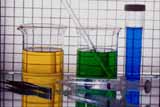|
Is there a single person in the United States that has not at one time or another benefited from the wonder drugs that modern medicine has to offer? And no, we don't mean the "wonder drugs" your stringy-haired next-door neighbor "Spacey Bob" is growing in his greenhouse. We mean prescription drugs and over-the-counter medicines—antibiotics, heart medicines, anesthetics, antihistamines. And, of course, the acne cream you used by the quart when you were 14.
There are, of course, instances where the side-effects of prescription drugs have caused people harm, but that's relatively rare. This is largely because new prescription drugs undergo years of rigorous testing before the US Food and Drug Administration approves them for use. Sometimes the drugs are disapproved because they are found to be unsafe. For approved medications, patients can then make decisions based on advice from their doctors and with the assurance that the side effects and potential dangers of a prescribed drug are well understood.
Despite the consumer-friendly names drug manufacturers give to their pharmaceutical products, they are chemicals, and all chemicals have a biological effect, whether it's intended
 or not. On the other side of the chemical chart are the non-pharmaceutical chemicals. Surprisingly, most of the non-pharmaceutical chemicals in use today in the US—from chemicals in paint, plastics, and furniture to industrial solvents and catalysts—have not been rigorously tested to determine their long-term effects on humans or the environment. Worse, your exposure to these chemicals is for the most part involuntary—you're exposed simply by drinking water, eating food, breathing air, and using everyday products.
or not. On the other side of the chemical chart are the non-pharmaceutical chemicals. Surprisingly, most of the non-pharmaceutical chemicals in use today in the US—from chemicals in paint, plastics, and furniture to industrial solvents and catalysts—have not been rigorously tested to determine their long-term effects on humans or the environment. Worse, your exposure to these chemicals is for the most part involuntary—you're exposed simply by drinking water, eating food, breathing air, and using everyday products.
Welcome to the Confounding Chemical Contradiction: The chemicals you have the OPTION to take—prescription drugs—are rigorously tested, but the chemicals you get whether you want them or not—non-pharmaceutical chemicals—have NOT undergone thorough tests. It makes no sense! It's eco-illogical!
What can you do about it? Purchasing eco-minded products helps. They typically have fewer and safer types of ingredients. It also helps to write your elected officials to urge them to pass laws to ensure that all chemicals undergo thorough long-term testing. Existing chemicals should be removed from use if they are not proven safe for humans and the environment, and new chemicals should not be allowed into use before they have undergone long-term testing—just like prescription drugs.
And now, if you'll excuse us, we see that our ten-year-old has just received a copy of the book "99 Dangerous Chemical Engineering Experiments You Can Do At Home"...
|


